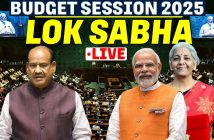By Venkatachari Jagannathan
Chennai, Jan 22 (IANS) From allowing company dividends to be linked to the market price of shares, scrapping of income tax (IT), goods and services tax (GST) on insurance policies to increasing the IT exemption limit to Rs 5 lakh are the expectations from the upcoming budget.
“There is no wish list. Just one wish. Zero tax,” quipped a Tamil Nadu government employee.
While that may be possible in utopia another interesting wish expressed by a chartered accountant is the linking of dividends declared by companies to the market value of the shares.
“Presently all companies are paying dividends at face value of shares. There is a huge gap between market price and face value. For example, the market price of TCS is around Rs 3,300 per share. whereas the face value is Re 1. Companies boast that they give dividends at 150 per cent or 200 per cent , which is nothing but Rs 2 or Rs 3 per share on a value of Rs 3,300. The yield is pathetic,” Srinivasan Jaishankar, a chartered accountant, told IANS.
“The government should ask companies to pay dividends at a benchmark rate on the average market price of the last 12 months. Say if the average share price of TCS is Rs. 3,000 per share, then they should give a dividend at 3 per cent of market price, which is Rs. 90 per share. In short, dividends should realistically relate to the inflation rate,” Jaishankar added.
According to Jaishankar, for MSMEs to survive and flourish individuals should be given an IT deduction of Rs. 5,000 if they buy anything from MSMEs making organic household goods, khadi products, handicrafts, pottery and others through Rupay, Gpay, BHIM and others. The government can create a portal for this so that MSMEs can register and all such payments are directly posted in the Annual Income Statement published by the Income Tax department so that they are entitled to deduction.
He added that all property transfers should be done electronically without any need to carry the mother document and others. A simple transfer acknowledgment stored in Digilocker should be sufficient.
On the other hand R. Balasubramanian, a private sector employee, listed his expectations from Finance Minister Nirmala Sitharaman’s 2023-24 budget as: “Increase in the IT exemption to Rs. 5 lakh, doubling of Standard Deduction to Rs. 1 lakh, hike deductions under Sections 80C (like PPF contribution) 80D (like health insurance premium). The gross taxable amount should be calculated after Standard Deduction.”
According to Balasubramanian, the new IT rates can start from 10 per cent for taxable income range of Rs.5 lakh to Rs.10 lakh, 20 per cent for Rs. 10 lakh to Rs. 20 lakh and 30 per cent for above Rs. 20 lakh.
With the interest rates going up on loans Jaishankar said: “The housing loan interest deduction should increase from Rs. 1.5 lakh to Rs. 3 lakh.”
He is not in favour of a uniform GST rate as it is not fair to have the same rate for a pack of cigarettes and for food items like UHT milk.
On GST, the one unanimous demand from the individual taxpayers is to exempt the life and health insurance policies from its ambit.
“The GST on a health insurance policy will be a huge amount if a person is over 60 years of age and old parents are also covered. If the government wants the insurance penetration to increase the policies should be made affordable,” G. Jambukeswaran who is in the pharmaceutical business told IANS.
Another interesting idea from Jaishankar relates to tipplers – digitising the liquor economy end-to-end with the government bringing a smart card for the retail purchases.
The rub off benefit will be that sale of liquor to minors can be curbed.
(Venkatachari Jagannathan can be reached at v.jagannathan@ians.in)
–IANS
vj/bg




